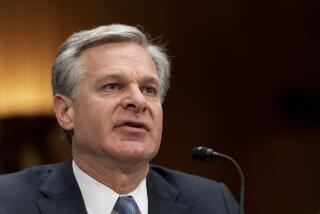FBI Chief Defends Agency’s Course of Action in Standoff
- Share via
WASHINGTON — An obviously relieved FBI Director Louis J. Freeh on Thursday night hailed the peaceful end of the 81-day standoff by the anti-government “freemen,” saying the FBI had “put patience above the risk of bloodshed.”
Freeh, meeting with reporters at FBI headquarters, said the FBI “made no deals to drop or lessen the federal charges” against any of the freemen in the on-and-off-again negotiations with the group in Jordan, Mont.
Responding to critics who claimed the FBI waited too long and did not attempt a “tactical” solution, Freeh said: “I understand their impatience. But it was essential that we followed our established crisis management procedures.”
Freeh said the standoff put to the test reforms the FBI made in its crisis response after the bloody results of the standoff by a fugitive and his family at Ruby Ridge, Idaho, in 1992 and the siege of the Branch Davidian compound near Waco, Texas, the following year.
Unlike those situations, “there was no factor of violence forcing us to move in at the risk of loss of life,” the FBI director noted.
This time the FBI tried “a fundamentally different approach” that “may not always work, but it worked here,” Freeh said.
Giving negotiators an equal place at the table with the tactical personnel did result in “disagreements” and “friction” inside the government camp, Freeh acknowledged. The disagreements were over the balancing of tactical pressures and continuing negotiations, he said.
But he rejected a questioner’s suggestion that the emphasis on avoiding violence could give groups seeking to challenge government laws a “free ticket.”
Instead, he said, the approach sent the “clear message that we will not back down from enforcing the law under any circumstances.”
Deputy Atty. Gen. Jamie S. Gorelick, standing alongside Freeh at FBI headquarters, insisted: “The tactical option was always on the table.”
The standoff cost “perhaps several millions of dollars,” counting the salaries of the agents and others already working for the government, Freeh estimated. But both he and Gorelick said cost was not an overriding factor.
Freeh said he regarded cutting off electrical power to the freemen compound to be a “critical factor” in the eventual resolution.
The FBI director said he calculated as a risk allowing the imprisoned freemen leader LeRoy Schweitzer to meet with one of the freemen from the compound, because there was the chance that Schweitzer would urge them not to give in.
There was no way of testing Schweitzer’s intentions, because Schweitzer would not talk with the FBI, Freeh disclosed.
Noting that “time was on our side,” Freeh indicated reports that the freemen were running out of food were accurate and that their generator capacity was limited.
While stressing that it was difficult to get into the minds of the freemen, Freeh said he thought the depletion of resources and energy and the realization that “the FBI was not going away” combined with “a growing trust between them and the FBI” to contribute to the peaceful outcome.
“We never broke a promise to them,” he said, and “we told them before things happened,” such as cutting off electrical power.
More to Read
Sign up for Essential California
The most important California stories and recommendations in your inbox every morning.
You may occasionally receive promotional content from the Los Angeles Times.













